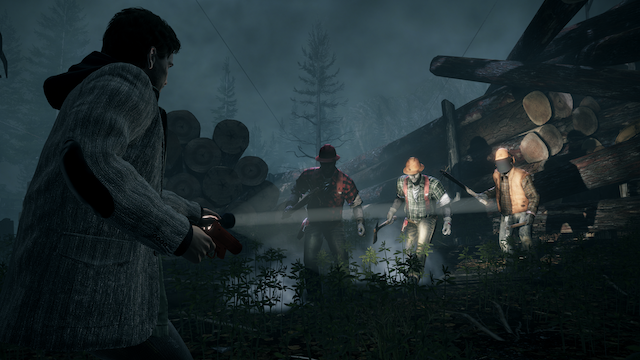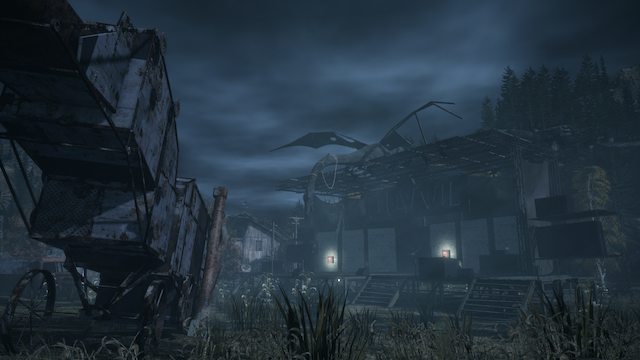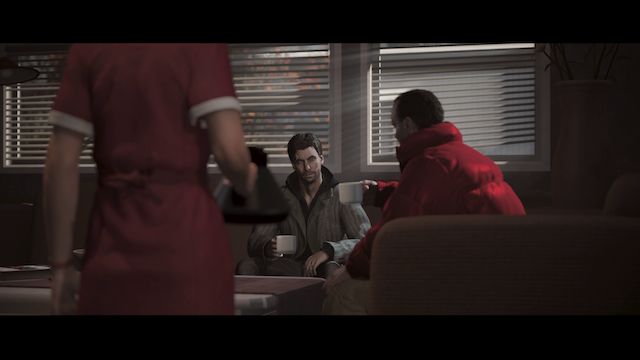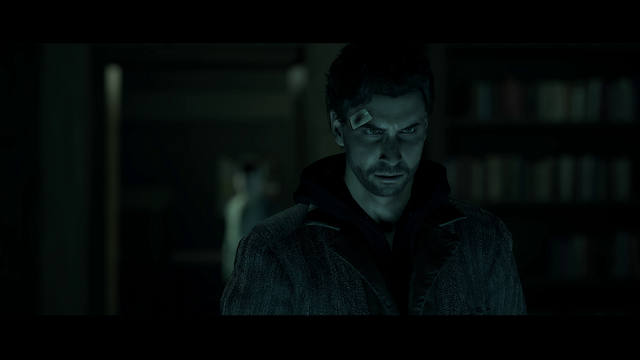In a land of remasters, there are far more deserving games than 2010’s Alan Wake, which still looks really good despite launching on Xbox 360. However, Alan Wake Remastered, the enhanced version of the cult classic thriller, does more than just touch up the imagery of the iconic Bright Falls.
With Alan Wake Remastered, Remedy is bringing the game to new platforms and longtime devotees alike, and in classic Remedy fashion, there are new secrets to be discovered.
As a game, it mostly holds up 11 years after its debut. But Alan Wake Remastered isn’t just a game. It’s a message: “It’s not a lake. It’s an ocean.”
Alan Wake Remastered: A Lake of Improvements, An Ocean of Promises
In this episodic thriller that borrows from Stephen King, David Lynch, and The Twilight Zone in roughly equal measure, players take on the role of the titular crime novelist. Suffering from writer’s block and his own general air of abrasiveness, Alan retreats to Bright Falls, Washington, a logging town with a dark history not immediately apparent to Alan and his wife Alice.
It’s there where Alice quickly goes missing and Wake finds himself behind the wheel of a crashed car, missing a week of time before suddenly discovering pages to a story he doesn’t recall writing. Alan Wake has all the markings of a serial drama of its time, and this Lost-ian approach to building mysteries on top of mysteries is quickly irresistible.
Across the full eight-episode “season,” (six episodes plus two packed-in DLC episodes), new players will find out what has kept this game at the forefront of players’ minds for years despite being mostly dormant since 2012’s XBLA semi-sequel, Alan Wake’s American Nightmare.
The game’s third-person shooting gameplay is akin to other Remedy games. Where Max Payne gives us slow-motion gunfights, Quantum Break bends time, and Control invents paranatural abilities, Wake uses light.
In Bright Falls exists a Dark Presence that takes over townspeople, turning them into sludgy shadows of their former selves. Wake’s iconic flashlight blasts the darkness away like destroying a shield, leaving them open to gunfire.
When it’s not the “Taken” in human form, it’s possessed objects like cars and fridges being flung at you by poltergeists, or flocks of shadowy crows. Enemies will flank you, throw things like hammers, and charge with chainsaws in hand.

It’s never quite a horror game, but in situations where Wake is overrun by the Taken, sometimes without even a gun, the tension truly mounts. Combined with expert pacing, good or better voice acting, and a licensed soundtrack of moody hits from David Bowie, Nick Cave, and more, it’s apparent early and often what’s made Alan Wake a beloved game all these years.
Visually, even the original game holds up pretty well today, but the remaster definitely improves things in a number of areas. My favorite of those improvements is the higher frame rate. As we’re a year into the new generation, I’ve found it hard to go back to 30fps games as of late. Thankfully, I don’t have to worry about that with Alan Wake Remastered, as the game runs in 60fps now.
Along with that, characters’ faces are much improved, as is the lip-syncing, save for an issue that sometimes appears during cutscenes that distances the animations from the audio ever so slightly. Epic said a fix for this is planned, but the patch had no announced date before I wrote this review.
It’s a well-done but fairly predictable remaster overall. It borders on looking like a modern-day game now, though there are things that couldn’t be fixed without a full remake.
At the forefront of those issues is an awkward jump and vaulting system. It’s not used too often — Alan is a novelist, not an athlete, after all — but whenever it does come up, it feels extremely faulty.
A slight delay in Alan’s jump and some geometrically challenging landing spots mean the game’s physics sometimes gets in the way, and players may miss jumps and fall to their deaths on occasion. Strangely, the DLC uses even more platforming as a misguided attempt to change up the gameplay loop. It never feels right.

While most of the things written above make Alan Wake a good game, it became something greater, a cult classic, for other reasons. The forests of Bright Falls literally breathe around you, and scenes alternate between narrow paths full of swarming enemies and larger exploratory sections hiding fun secrets only Remedy would create, such as a live-action homage to Rod Serling’s aforementioned classic anthology.
The wind swirls the trees restlessly as the fog hides monsters just out of view. A blue tint swallows up every scene, except for the rare golden hours of daylight Alan enjoys during his hellish trip. From the depths of the mining caves to the summit of Mirror Peak, Bright Falls is unforgettable and rich with history and secrets in equal measure.
There’s long been a unique relationship between Remedy and its fans, where the developer catered to an audience of passionate lore-divers in project after project. In 2010, Alan Wake was quickly a diamond in the rough for its cliffhanger story and rabbit hole of mysteries, seemingly designed even then with an eye toward the bigger picture, the Remedy Connected Universe. Fans wanted more and for a decade, they’ve waited for it.
In the absolute best example of Remedy knowing how to woo its fans, Alan Wake Remastered hides brand-new secrets, never before seen, that seem to allude to a proper sequel to Alan’s story. I won’t spoil these outright here, but I can tell you that for a big fan of the RCU, which I am, discovering these new breadcrumbs is by far the most exciting part of the remaster.
While prettier textures and an improved frame rate make for welcome modernizations of the game, naturally coming upon new secrets in Alan Wake Remastered is one of my favorite gaming thrills of the year. A long time ago, Remedy said Cauldron Lake, and really Alan Wake, is actually an “ocean.” While fans have spent years dissecting that meaning, it was always obvious that more to this story was planned from the beginning.
The prospects of that sequel have never looked greater than they do today, and among an ocean of improved visuals and strong-as-ever storytelling, there is tremendous hope for Alan’s next story.
Alan Wake Remastered Review — The Bottom Line

Pros
- Paced like must-see TV and laden with exciting mysteries
- Brilliant atmosphere set in a town rich with history
- Gameplay loop of fighting with light is still fun 11 years later
- Hides brand-new secrets that tease more to the story
Cons
- Lousy platforming sections
- A minor lip-sync issue in some cutscenes
Though it shows its age in some places, Alan Wake remains every bit as fascinating today as it was in 2010. Remedy makes games unlike anyone else’s, and no game in the studio’s history has ever represented its singular strangeness more than Alan Wake.
Improved with features like higher resolution and increased frame rate, Alan Wake Remastered actually hides its best feature for the biggest fans to uncover on their own.
[Note: Remedy Entertainment provided the copy of Alan Wake Remastered used for this review.]







Published: Oct 1, 2021 02:01 pm